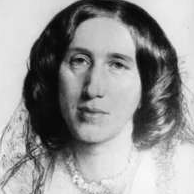The Lifted Veil, by George Eliot
The contemplation appeared to displease him, for he frowned sternly, and said to my father, drawing his thumbs across my eyebrows—
“The deficiency is there, sir—there; and here,” he added, touching the upper sides of my head, “here is the excess. That must be brought out, sir, and this must be laid to sleep.”
I was in a state of tremor, partly at the vague idea that I was the object of reprobation, partly in the agitation of my first hatred—hatred of this big, spectacled man, who pulled my head about as if he wanted to buy and cheapen it.
- The Lifted Veil, Chapter 1

About the book
Published the same year as her first novel, Adam Bede, this overlooked work displays the gifts for which George Eliot would become famous—gritty realism, psychological insight, and idealistic moralizing. It is unique from all her other writing, however, in that it represents the only time she ever used a first-person narrator, and it is the only time she wrote about the supernatural.
The tale of a man who is incapacitated by visions of the future and the cacophony of overheard thoughts, and yet who can’t help trying to subvert his vividly glimpsed destiny, it is easy to read The Lifted Veil as being autobiographically revealing—of Eliot’s sensitivity to public opinion and her awareness that her days concealed behind a pseudonym were doomed to a tragic unveiling (as indeed came to pass soon after this novella’s publication). But it is easier still to read the story as the exciting and genuine precursor of a moody new form, as well as an absorbing early masterpiece of suspense. - Goodreads































































0 comments
Sign in or create a free account